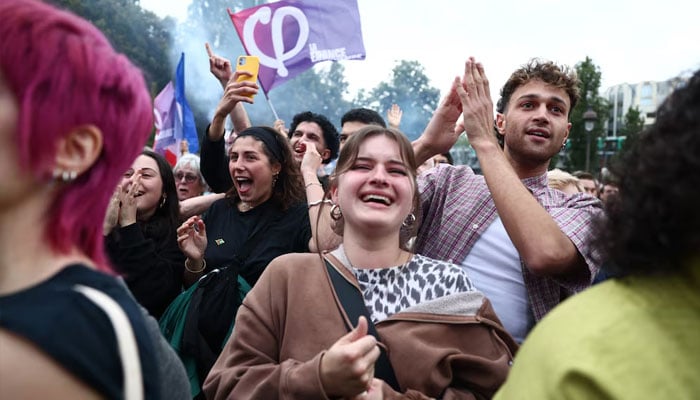
French Elections Leave Parliament DividedFrench Elections Leave Parliament Divided Voters in France delivered a major setback to Marine Le Pen’s far-right, Eurosceptic Rassemblement National (RN) in Sunday’s parliamentary elections. Despite early predictions of a comfortable victory for the RN, they ultimately finished in third place. Left-Wing Alliance Surprises Instead, a left-wing alliance known as the New Popular Front (NFP) emerged as the largest group in parliament. The NFP, which advocates for measures such as price caps on essential goods and a wealth tax, secured an estimated 184-198 seats. Macron’s Centrists Disappointed President Emmanuel Macron’s centrist alliance, which called the elections to clarify the political landscape after losses in the European Parliament elections, failed to secure a majority. Pollsters estimated that they won 160-169 seats. RN’s Ambitions Thwarted The RN, led by Marine Le Pen, had made significant gains in recent elections. However, the party’s anti-immigrant and Eurosceptic platform failed to gain enough support to form a majority government. They are expected to have 135-143 seats. Political Gridlock The divided parliament presents a challenge for France. With no single group holding a majority, passing legislation and implementing policy will be difficult. This could weaken France’s role within the European Union and beyond. Next Steps Uncertain The NFP has indicated its desire to govern, but whether it can maintain its unity and secure enough support from other parties remains uncertain. President Macron is expected to consult with various political groups to determine the next steps. RN’s Future Despite the setback, Le Pen vowed that the RN had planted the seeds for its future. The party’s strong showing in the elections suggests that it will remain a significant force in French politics. Voter Dissatisfaction The elections reflected voter dissatisfaction with Macron’s government, particularly over the cost of living and immigration. The left-wing and far-right parties capitalized on these grievances to make gains.
Voters delivered a major setback to Marine Le Pen’s nationalist, Eurosceptic Rassemblement National (RN)
 Supporters of the French far-left opposition party La France Insoumise (France Unbowed – LFI) react after partial results in the second round of the French snap parliamentary elections at Place Stalingrad in Paris, France, July 7, 2024. — Reuters
Supporters of the French far-left opposition party La France Insoumise (France Unbowed – LFI) react after partial results in the second round of the French snap parliamentary elections at Place Stalingrad in Paris, France, July 7, 2024. — Reuters
- Polls predict that the left-wing alliance will be the first to vote for 198 seats.
- Macron’s centrists were expected to win 169 seats.
- The far-right RN and allies are expected to win 143 seats.
France faced a potential political impasse after Sunday’s elections left parliament divided. A left-wing alliance unexpectedly took first place, ahead of the far right. However, no group won a majority.
Voters dealt Marine Le Pen’s nationalist, Eurosceptic Rassemblement National (RN) a major setback. The party had already won the second round of voting, according to pollsters, but ultimately finished in third place.
The result was also a setback for moderate President Emmanuel Macron, who called early elections to clarify the political landscape after his candidate was soundly punished by the RN in last month’s European Parliament elections.
He ended up with a hugely fragmented parliament, which would weaken France’s role within the European Union and elsewhere in the world and make it difficult for anyone to push through a domestic agenda.
The elections will divide parliament into three large groups: left, centrists and far right. These groups have very different positions and have no tradition of cooperation.
What happens next is uncertain.
The left-wing alliance New Popular Front (NFP), which wants to set a cap on the prices of essential goods such as fuel and food, raise the minimum wage to 1,600 euros net per month, increase civil servants’ wages and introduce a wealth tax, immediately indicated that it wants to govern.
“The will of the people must be strictly respected… the president must invite the New Popular Front to govern,” said far-left leader Jean-Luc Melenchon.
Under Le Pen’s leadership, the RN has managed to shake off a historical reputation for racism and anti-Semitism, but many in French society still view its France-first stance and growing popularity with suspicion.
At the left-wing rally in Paris, the voting results were announced and there were hugs, cries of joy and tears of relief.
The Republic Square in central Paris was filled with crowds and a festive atmosphere prevailed, with left-wing supporters playing drums, lighting torches and chanting, “We won! We won!”
“I am relieved. As a French-Moroccan, doctor and environmental activist, what the far right proposed as a government was madness,” said 34-year-old Hafsah Hachad.
The uneasy left-wing alliance, which the far-left faction, Greens and Socialists had hastily formed before the vote, was far from an absolute majority of 289 seats in the 577-seat assembly.
Official results trickled in, with most if not all constituencies likely to be out in the early hours of Monday. Pollsters – who are generally accurate – had predicted the left would get 184-198 seats, Macron’s centrist alliance 160-169 and the RN and its allies 135-143.
The euro fell on Sunday after election forecasts were released.
“We should get a brief respite in the market… because we don’t see an extremist RN majority, but it will likely lead to political gridlock at least until fall 2025,” said Aneeka Gupta, director of macroeconomic research at WisdomTree.
Prime Minister Gabriel Attal said he would resign on Monday but would remain as caretaker minister for as long as necessary.
‘Divided’
A key question is whether the left alliance will remain united and agree on the way forward.
Melenchon, leader of the far-left France Unbowed (LFI) party, ruled out a broad coalition of parties with different tendencies.
Raphael Glucksmann of the Socialist Party called on his allies to behave like “adults”.
“We are in favor, but we are in a divided parliament,” he said. “We will have to talk, discuss, engage in dialogue.”
The constitution does not oblige Macron to ask the left-wing group to form a government, although that would be the usual step because it is the largest group in parliament.
There was no indication in Macron’s entourage of his next move.
“The question we have to ask ourselves tonight and in the coming days is: which coalition is capable of winning the 289 seats and governing?” a person close to him told Reuters.
Some in his alliance, including former Prime Minister Edouard Philippe, envisioned a broad multi-party alliance but said the far-left France Unbowed could not be part of it.
RN disappointment
For the RN, the result was a stark departure from weeks in which polls consistently predicted they would win comfortably.
The left-wing and centrist alliances worked together after the first round of voting last week, withdrawing dozens of candidates from three different races to create a unified anti-RN voice.
In his initial reaction, RN leader Jordan Bardella called the collaboration between anti-RN forces a “scandalous alliance” that he said would paralyze France.
However, Le Pen, who will be the party’s candidate for the 2027 presidential election, said Sunday’s vote, in which the RN made big gains compared to previous elections, had planted the seeds for its future.
“Our victory has only been postponed,” she said.
Voters punished Macron and his governing alliance for the cost of living crisis and failing public services, as well as for issues surrounding immigration and security.
Le Pen and her party played on those grievances, expanding their appeal far beyond their traditional strongholds along the Mediterranean coast and in the country’s northern rust belt. But that wasn’t enough to win them power.